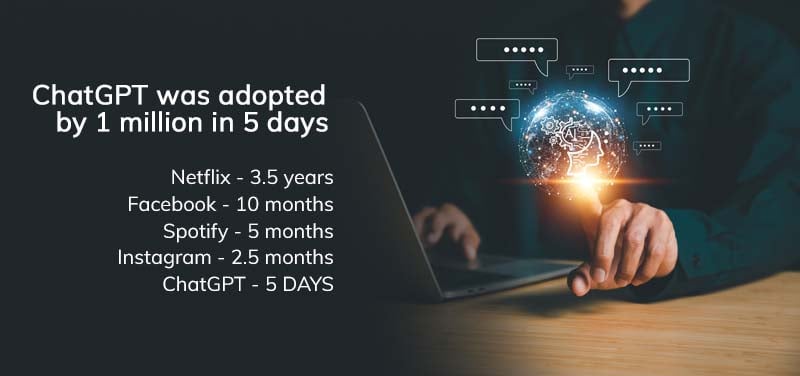ChatGPT and artificial intelligence (AI) have taken the world by storm in 2023 and it is being applied across countless platforms. While on the surface it can create content, that is actually not where the power will be found. In fact, if used purely to create content AI could have long-term detrimental SEO effects. AI is changing the way people search for answers to their questions so it could disrupt search engine marketing and a lot of the things we do.

|
On-Demand Webinar |
Chris Leone on CU broadcast |
|
|
What is ChatGPT?
It’s a free program created by Open AI and can communicate in natural language. AI has been around for a while in tools we use every day such as Grammarly, Siri, Google Assistant, financial fraud detection, and YouTube’s recommended videos.
ChatGPT is a step beyond those; making very human-like text interactions. It's a really smart chatbot trained on a massive data set of text, primarily the web. It returns information back to you in a familiar way; long-form text that makes communication feel more natural.
Current Search vs. AI search
When a user searches in Google it returns short text-format answers and links to websites to learn more. That’s where those of us in the SEO world have operated for many years, using tactics to rank our content at the top of search results pages to attract the target audience to the website. However, ChatGPT has quickly become a tool people use to ask questions and it returns a long-form answer using information gathered from the internet but does not cite sources. ChatGPT interacts with the user, giving information but not the list of page links where more information can be found. This could significantly impact how businesses get attention online.
How should credit unions use ChatGPT for content marketing?
Is ChatGPT the answer to prayers to quickly produce content and rank well?
No, content produced by ChatGPT is very detectable as generated by AI so not likely to rank in search results. We don’t recommend using it to crank out blog posts to generate traffic. But there are cool things you can do with ChatGPT to guide your content strategy. Think of it as a helper to make your content better but don’t ask it to do all the work.
Examples of ChatGPT prompts to help you write more effective, higher-ranking content:
- Content ideas - Generate topic ideas based on your target audience: "What financial concerns top the list for people under 45?"
- Outline of a topic - Prompt it to “Write blog post outline with the title: Credit Union Tips to Use in the New Year”. ChatGPT can take the ideas and give a starting point and then you can write the piece based on the outline.
- Check your work - After you write the article based on the idea or outline from AI, paste your work into the tool and ask ChatGPT to grammar-check it.
- Get recommendations to improve - Ask “How can I make this post more effective at providing more valuable credit tips?”
- Get an objective opinion - Compare content by pasting in two different pieces and ask “which is more effective”?
- See if your message conveys - Improve your content by asking questions with specific intent. Paste in copy from a page you want to get more information and ask, “Is anything on this page confusing?”, “Which page is better to open a home loan?”, “Is there anything unclear?” and it gives recommendations.
- Get more conversions - "How can I improve the content so more people contact me about the subject?"
Experiment with different prompts to get the intent of the piece. For example, you can ask ChatGPT to rewrite the piece targeting a specific age or job description and it can optimize and improve your content.
How are Google and Bing incorporating AI?
It’s a revolution in the search engine environment. Both Google and Bing search engines are working on baking AI into their search experiences. Bing invested in ChatGPT and as of March 16, 2023 people who click the "join the waitlist" button and login can use the chat feature to search. Google has been investing in DeepMind for longer and is likely being forced to reveal it sooner than it planned due to the increased use of and demand for ChatGPT.
Bing is being much more aggressive with AI implementation because they have a lot to gain. They currently have about 6% of the market share of search and 5% of their revenue comes from ads. However, Google has a lot to lose and it slower to implement AI. It has a 90% search market share and 80% of its revenue comes from advertising so changing how it operates could be costly. Google has to be more conservative even though its technology is likely more powerful.
The landscape is rapidly evolving, users are quickly adapting, and marketers need to be ready to respond. For now, use AI tools to continue creating unique quality content. As users evolve in how they search on ChatGPT, Bing, and Google, it will pay to be ready. The team at WebStrategies is watching closely to stay ahead of the curve and will continue sharing the latest - so stay tuned because we want to keep credit unions well informed so leads from search continue to increase membership.
Learn more:







Agree, disagree, or just have something to add?
Leave a comment below.